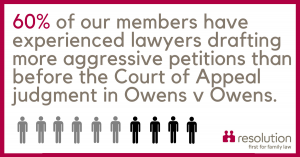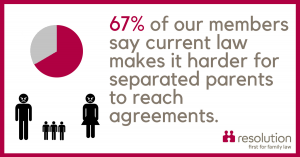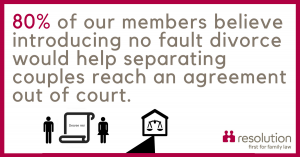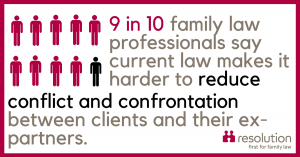This week is ‘Good Divorce Week’, Resolution’s National Annual Awareness Raising Week which is aimed to minimise the impact of conflict on children.
As part of #GoodDivorceWeek, Consilia Legal are hosting a series of workshops on 29th November 2018 based on parental conflict and how we as professionals can help to reduce it. This event is ideal for any professionals working with separated families including solicitors, mediators and relationship coaches. To sign up, follow this link: https://www.tickettailor.com/events/consiliamediation/195298.
At our event, we are looking at how to reduce hostility between parents, how to help and direct young adults who are struggling with their parent’s separation, how attending a separated parenting information programme will reduce hostility and how child inclusive mediation will assist in separations.
It is a very important topic to Consilia Legal who actively promote alternative dispute resolution and always have at the forefront of their advice, how to reduce hostility and not to enflame it.
Conflict can have some serious long-term effects on children. Studies have shown that it’s not the separation or divorce that has an impact, but rather the conflict stemming from it that often has a detrimental impact on their well-being.
At Consilia Legal we are members of Resolution and members are committed to reducing conflict and agreeing to a non-confrontational way of working that puts the best interests of children first.
The current law says that unless you have been separated for 2 years with consent, or 5 years without, you have to divorce on the grounds of adultery or behaviour. In 2016, the majority (60%) of divorces in England and Wales were granted on adultery and behaviour.
Divorce is always difficult but having to show fault can increase the conflict between the couple and make it more difficult to sort out child and financial arrangements. 71% of the population agrees that no fault divorce is urgently needed to protect the long-term interests of children.
Without wanting to trivialise it, we call it ‘the blame game,’ but one that can have very serious consequences for the couple and any children they might have. Urgent reform is needed to remove blame from the process to reduce the negative impact of conflict on children.
Facts: Divorce in England and Wales
- There are over 100,000 divorces in England and Wales each year. (ONS 2018)
- Behaviour is the most common Fact used for opposite-sex divorce (52%) and same-sex divorce (83% among women, 73% among men). (ONS 2018)
- In 2015, 60% of divorces in England and Wales were granted on adultery and behaviour, compared with just 6-7% in Scotland where the law is different. (Finding Fault 2017)
- National opinion survey showed only 29% of respondents to a fault divorce said that the Fact used very closely matched the reason for the separation. (Finding Fault, 2017)
- Fault is associated with shorter marriages, and evidence shows that fault enables a quick exit from a marriage. (Finding fault 2017)
What Resolution members think of current law (2018 Resolution survey)
- 90% say current law makes it harder to reduce conflict between ex-partners.
- 67% say the current law makes it harder for separated parents to reach agreements.
- 80% feel the introduction of no fault divorce would help separating couples reach an agreement out of court.
What young people (14-22 year olds) think (2015 ComRes survey)
- Of those who have experienced family breakups, 82% would prefer their parents to part if they are unhappy.
- More than 60% felt their parents had not ensured they were part of the decision-making process in their separation or divorce.
- Half of young people indicated they did not have any say as to which parent they would live with or where they would live.
- 88% agreed it was important to make sure children do not feel like they have to choose between parents.
- About half admitted not understanding what was happening during their parents’ separation or divorce, while 19% agreed that they sometimes felt like it was their fault.
- Resolution’s research suggested that many parents handle their separations well: 50% of young people agreed that their parents put their needs first.
How divorce and separation affects young people (14-22 year olds) (2014 ComRes survey)
- 19% said they didn’t get the exam results they were hoping for.
- The majority (65%) say that their GCSE exam results were affected while 44% say A-levels suffered.
- Almost a quarter (24%) said that they struggled to complete homework, essays or assignments.
- More than one in 10 (11%) said they found themselves “getting into more trouble at school, college or university,” with 12% confessing to skipping lessons.
- 14% of the young people surveyed said they started drinking alcohol, or drinking more alcohol than previously, while almost three in ten (28%) said that they started eating more or less than previously.
- 13% admitted to experimenting or thinking about experimenting with drugs as a result of their parent s’ break-up.
- 32% of respondents said one parent tried to turn them against the other.
- More than 1 in 4 (27%) said their parents tried to involve them in their dispute.
- Almost 1 in 5 (19%) saying that they completely lost contact with one or more grandparents.





